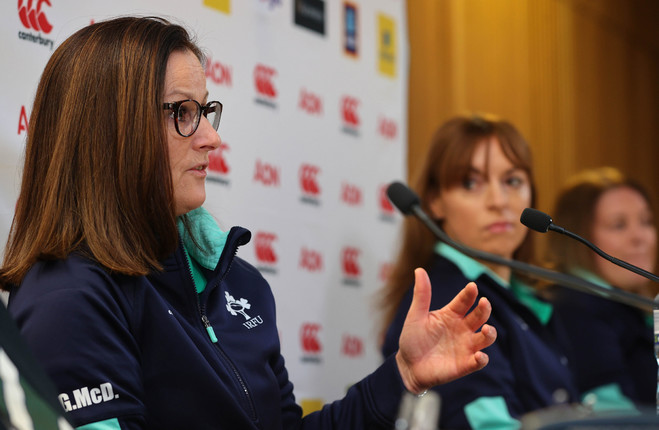IRFU HEAD OF Women’s Performance and Pathways Gillian McDarby has expressed her confidence that the recommendations set out in the Women In Rugby Report can persuade Ireland’s international stars to ply their sporting trades on home soil.
When Ireland secured a last-gasp victory over Scotland in Belfast at the end of this year’s Six Nations Championship, team captain Nichola Fryday was one of six players in their starting line-up that was with a club in either England or France. Despite the advent of professional contracts for Irish women’s players in recent times, five of this cohort – Linda Djougang being the sole exception – have opted against taking up his offer from the union and will remain overseas for the time being.
While McDarby revealed this will have no impact on international selection in 2023, she is hopeful that improving the standard of competition available to Irish players – which acts as a key component of the report that was published yesterday – will entice the likes of Fryday and Rugby Writers’ Player of the Year Neve Jones back to these shores.
Although just one team each from Ireland, Scotland and Wales are set to compete in the much-discussed Celtic Cup competition in the new year, McDarby expects this will expand over time.
“If you look at the whole season and what that would look like in a years’ time. You’re looking at Interpros in December/January. You’re looking at Celtic Cup in February, Six Nations in March and April. Warm-up games in August/September for Global XV and then Global XV in October/November,” McDarby explained.
That’s a pretty jammed season and there’s plenty of high-level competition for those girls. I think that will encourage people back and that’s why we need to put these structures in place. The reason why they left is because they didn’t have the level of competition that they needed to make themselves better.
“By us strategically working with other unions to get these competitions up, we’re going to encourage players back and keep them here.”
The 29 women’s players who have signed up to professional deals with the IRFU – spread across the 7s and 15s codes – will be based at the High Performance Centre in Abbotstown for training and match preparation. Yet McDarby insists this doesn’t mean that there will be a wave of players leaving their current clubs and provinces to join forces with Leinster or one of Dublin’s prominent All-Ireland League outfits.
One of the chief concerns raised in the Women In Rugby Report was the fact that players were migrating to the capital in order to sign up with the likes of Railway Union, Blackrock College and Old Belvedere – who have all featured in the knockout stages of the Women’s AIL in recent weeks.
“We haven’t asked any player to leave their club or their province. Just because you’re contracted doesn’t mean we’re all asking you to join clubs in Dublin. We want you to stay with your club. That link with the club is so important. It’s part of our strategic vision and the same with the provinces as well. The province’s links with the club ensures the sustainability of what we’re trying to do.”
Even though a key recommendation within the Women In Rugby Report pointed towards the All-Ireland League being restructured to a 12-team competition that is divided evenly into two tiers of six, it is still uncertain how often the country’s elite players will be playing in it.
Tonight sees Railway Union and Blackrock College locking horns in the Women’s AIL final, but both teams will be missing some star names due to the latest leg of the Sevens World Series taking place in Cape Town this weekend.
Following up on McDarby’s assertion that “national duty will always trump the club game” when there is a clash between international and domestic action, Fiona Steed – the former Ireland international who serves as Chair of the IRFU Women’s Sub-Committee – acknowledged this is is the reality that comes with a move into professionalism.
“I’m not comparing it to the men’s, but as a reflection piece, there was a lot of controversy back in the day when it went professional and the whole club versus province. We saw last year and we saw it during Covid how that connection between the academies and the clubs in the Men’s AIL is now working again much more succinctly, to allow people to play rugby,” Steed said.
“That’s what we need to evolve to. That it’s fluid and it’s for the betterment of Irish rugby and the betterment of the participation, and that everybody gets to play. It’s going to evolve and we need to be fluid. There needs to be an acceptance that it’s going to take time and it will never be 100%, but that we work together.
“If I had a choice of playing in a Women’s AIL final or playing in Cape Town… isn’t it great to be privileged to have that, ‘Oh God, but actually I’m playing 7s’. I understand where they’re coming from, but they’re going towards being professional athletes and it’s a different ball game when it gets to that.”
The42 is on Instagram! Tap the button below on your phone to follow us!
